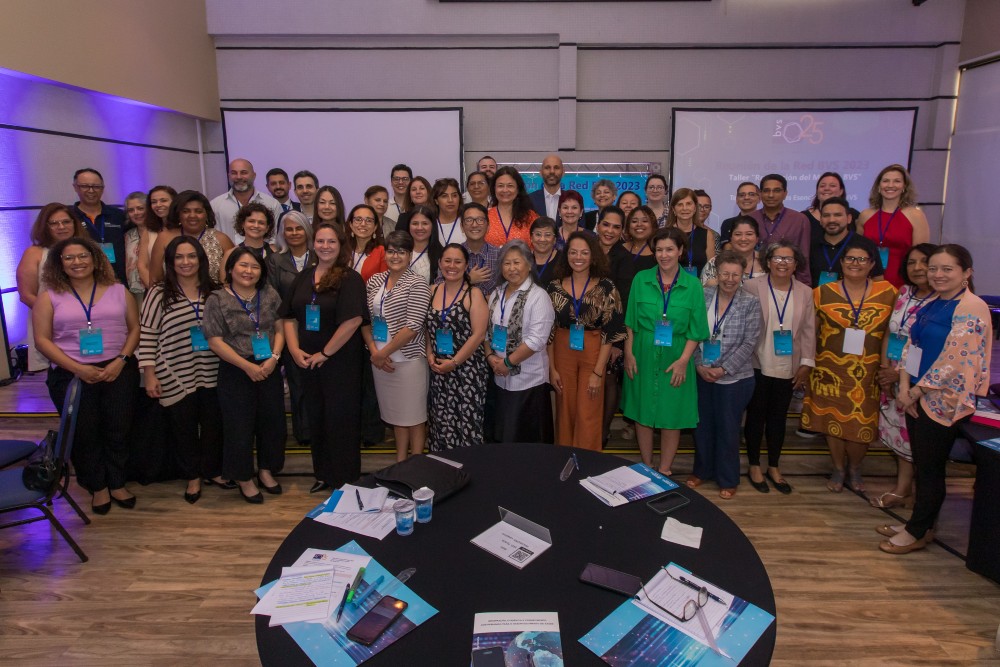March 2025 marks the 58th anniversary of BIREME – the Latin American and Caribbean Center on Health Sciences Information of the Pan American Health Organization/World Health Organization (PAHO/WHO) – one of the longest-lived and most strategic institutions in the Region of the Americas. Founded in 1967 as the Regional Library of Medicine, BIREME maintains its original mission of facilitating access to scientific and technical health information, while reinventing itself in the face of contemporary challenges posed by digital transformation, artificial intelligence (AI) and the growing demand for quality knowledge to guide public health decisions.
Over more than five decades, BIREME has established itself as a reference center in health information and knowledge management, with a technical cooperation model based on the creation and development of Virtual Health Libraries (VHL) and other information products, which are structured in regional networks and aligned with the needs of health systems in Latin American and Caribbean countries. Linked to the PAHO/WHO Department of Evidence and Intelligence for Action in Health (EIH), the Center operates in close collaboration with national, regional and global institutions and networks.

Digital transformation and innovation guide the 2023-2025 Strategy
In recent years, BIREME has advanced in a process of institutional transformation that reflects the changes in the global ecosystem of scientific information. The BIREME 2023-2025 Strategy introduces three central pillars: strengthening decision-making capacity in health systems; expanding strategic partnerships and regional technical cooperation; and digital innovation using advanced technologies, especially artificial intelligence (AI).
Among the recent milestones, the VHL stands out as a key part of its technical cooperation program, launched in 1998 and currently bringing together 58 sources of information, more than 39 million records and an annual average of 41 million sessions on the Regional Portal. Recognized as Good Practice in South-South Cooperation by the United Nations at the age of 27, the VHL continues to be one of the main gateways to scientific health information in Latin America and the Caribbean.
The VHL’s main source of information, the Latin American and Caribbean Health Sciences Literature (LILACS) database, which has been in operation for 40 years, also reflects BIREME’s 58-year history of promoting the science produced in the region. With more than 1.1 million scientific and technical documents from Latin America and the Caribbean, LILACS was expanded in 2024 with the launch of LILACS Plus — an integrated collection of around 2 million records from LILACS, MEDLINE and other sources. The initiative strengthens the visibility of regional scientific production and its inclusion in global health information flows.
AI initiatives and regional and global cooperation
The application of AI in information management processes was also highlighted in 2024 with the development of DeCS Finder AI, a tool that speeds up and improves the automatic indexing of documents with Health Sciences Descriptors (DeCS/MeSH), a system used by hundreds of institutions to organize health literature.
In the same context, BIREME expanded its activities in the production of Evidence Maps, a graphic resource that supports the systematization of scientific studies to support the formulation of public policies. In all, there are 72 evidence maps available, 17 of which were launched in 2024 alone, with a new platform under development for AI-based integration.
The cooperative dimension of BIREME’s work is manifested in the intense agenda of meetings with the VHL Network and its associated networks, which registered a 20% increase in participation in 2024, with 22 sessions held and more than 100 connections per meeting, bringing together countries from all over the region. At the global level, BIREME leads actions such as the Global Index Medicus (GIM), now with more than 2 million records; and the development of the Traditional Medicine Global Library (TMGL), scheduled for global launch at the Second WHO World Summit on Traditional Medicine in December 2025.
New products, digital health and institutional strengthening
With Brazil’s Ministry of Health and PAHO Brazil, BIREME has been collaborating on the development of digital solutions aimed at Primary and Specialized Health Care. One of the highlights is the new Formative Second Opinion (SOF) program, which answers frequently asked questions from health teams based on contextualized evidence for Brazil’s Unified Health System – SUS. Another example is the Decision Support Platform, aimed at the general population, which seeks to improve the care process and the autonomy of citizens.
In addition, BIREME provides technical support to the Interagency Health Information Network (RIPSA) with the development of APIs, plugins and improvements in indicator publication flows, strengthening the analytical capacity of the Brazilian health system.
Internally, the Centre is making progress in adopting agile methodologies, modernizing its computer infrastructure and qualifying its technical and management staff as a high-performance team. The promotion of an organizational culture geared towards innovation, together with the continuous strengthening of institutional partnerships and the diversification of its funding sources, are key strategies for guaranteeing institutional sustainability and expanding BIREME’s impact in the near future.
58 years in health knowledge
BIREME’s trajectory is marked by its strategic role as a bridge between science and health action, supporting managers, professionals, researchers, users, and citizens in building more informed, resilient, and evidence-based health systems. This mission, which has been continuously continually renewed over the years, remains highly relevant to current and future challenges in the Region.
“At 58 years of age, BIREME reaffirms its commitment to innovation, collaboration, and equitable access to scientific and technical health information. In an ever-changing world, this mission is even more important to promote the health and well-being of the people of the Americas. It is an honor and a privilege to lead the Center at this moment. I salute and thank the entire BIREME family — our staff, institutional partners, and users — for their commitment to this journey.”
João Paulo Souza, Director of BIREME/PAHO/WHO.